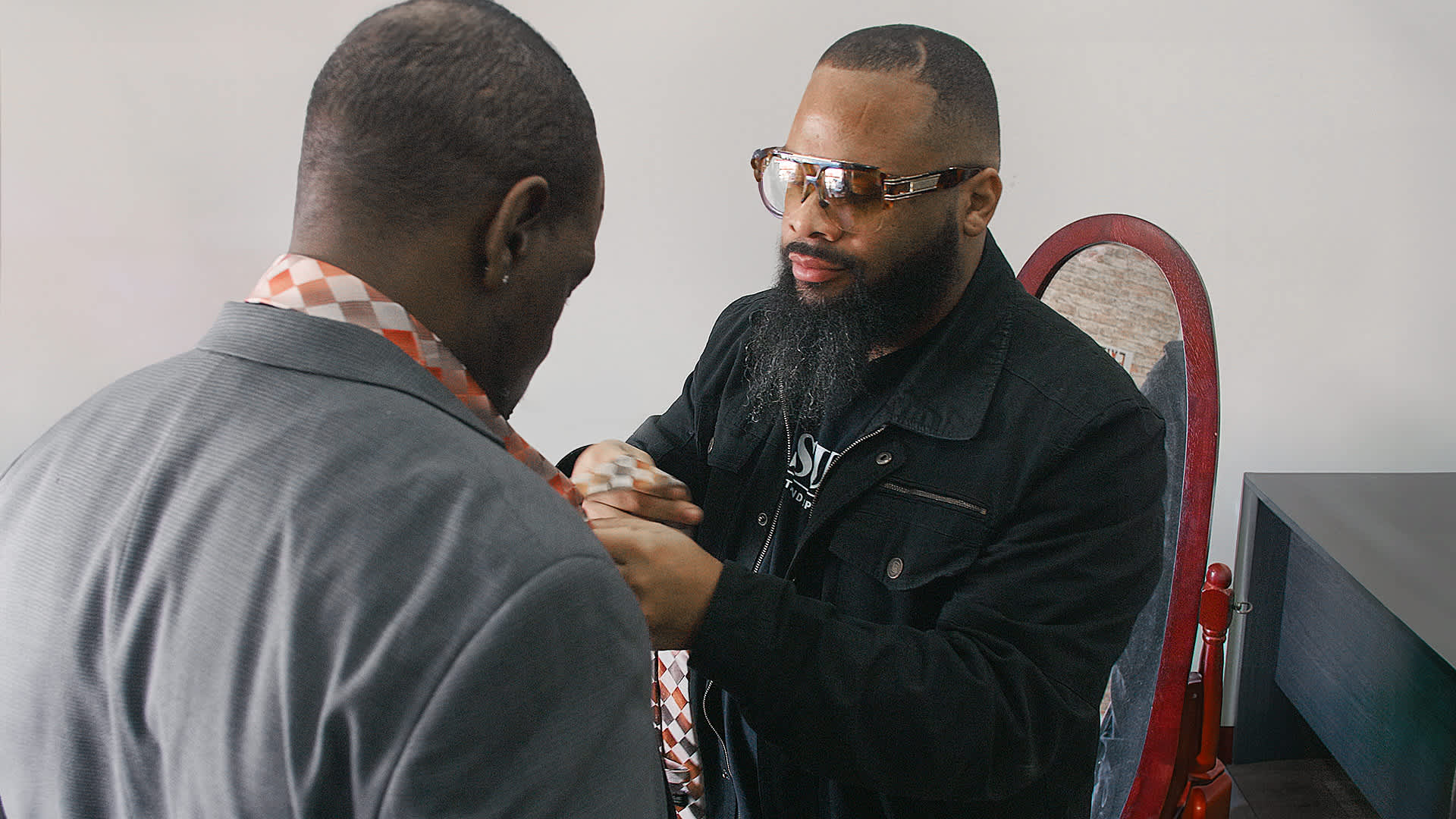
In a small storefront in Laurelton, Queens, Kevin Livingston holds a stylish patterned tie up against the chest of his latest customer, a man named Jimmy. “That’s sharp, isn’t it?” Livingston says to the general approval of the handful of people in the room. “Do you know how to tie a tie?” he asks. Jimmy shakes his head no; Livingston patiently walks him through the process. The outfit secured, Jimmy is escorted to the back of the room, where a man named Terrell stands over a barber chair, next to a sign that reads “Rellz Dream Kutz.” A short while later, Jimmy emerges, head shorn, the bristly beginnings of a small beard trimmed. “He’s walking different,” enthuses Livingston as Jimmy departs into the brisk December afternoon.
100 Suits — “Stand Out, Stand Up, Stand Tall,” reads a slogan on the storefront awning — is not a typical clothier. That suit is not just a piece of clothing, but, Livingston believes, Jimmy’s first step in rebuilding his life. Livingston, a Queens native, began 100 Suits more than a decade ago with an idea as simple as its name: to give away 100 suits to people who needed them.

Livingston, then in the early stages of a career in banking, would notice young men hanging out on the street on his daily walk to work. “Their pants would be sagging,” he says. Livingston, from an early age, had taken a different sartorial path, guided by his professional-minded father. “He had a travel agency, and he’d make me get all dressed up on a Saturday to go in and stamp travel brochures,” says Livingston. “It was all about representation.”
At the bank, Livingston began collecting donated suits on the side and stashing them in the employee closet. (He was so successful that he got reprimanded by his manager — who now, in a poetic twist, works at 100 Suits.) He began distributing those suits, no questions asked, at “pop-ups” on the streets of Queens — outside of a Popeyes, at alleged gang sites, or next to gun buyback programs. When people put on the garments, he’d see the impact immediately. “I always call it the alien effect,” he says, mimicking someone uncomfortably wrestling into a garment. “They put on a jacket, and they don’t know how to move their arms. But that right there is the initial change. It’s an instant transformation.”
When a city agency offered him a contract, he faced a decision: “I could stay at my job, making $40,000 a year, or I could get a $5,000 contract, payable over nine months,” he says. “I absolutely went for the latter.” Through sheer hustle — “I used anything and everything I had,” he says — 100 Suits began to gain a foothold. Community support, Livingston says, was also invaluable. He cites a long list of people who opened their doors to his effort, from his barber to the father of Sean Bell, the unarmed Queens man shot by undercover police in 2006. Eventually, he was getting suits from high-profile donors like Colin Kaepernick and Steve Martin.
But early on, Livingston realized that simply handing out suits was not enough. “I remember one guy, we suited him up, and I came downstairs later for lunch, and I saw him selling it in front of the train station,” he says. “That’s when I realized I was doing more of an injustice than a justice.” So he began to evolve his approach to be more “wraparound, therapeutic.”
Today, 100 Suits has five sites across New York City and about 30 staff members, working in everything from violence reduction to workforce development, from computer literacy for seniors to a program in the city schools to mentor troubled students. Livingston makes frequent trips to the prison on Rikers Island, delivering turkeys for Thanksgiving or setting up comedy shows for the holidays.
When the pandemic struck, Livingston quickly pivoted to delivering meals to seniors. Through that, he developed a relationship with Lyft, which provided assistance in the form of ride credits. The rideshare company has since partnered with 100 Suits to help members of communities that have historically been underserved, especially when it comes to transportation, access opportunities like job interviews or networking events. Livingston has a “gravitational pull,” says Larry Gallegos, Lyft’s public policy manager. “He just draws people to him, and you want to help him. He has the support of all the key community stakeholders in the area. You say ‘100 Suits,’ and people are like, ‘Yeah, that’s a great organization.’ ”
However, “Suiting,” as Livingston calls it, sitting in his office, beneath a picture of him shaking hands with President Biden (one of three presidents he has met), “will always be the cornerstone of what we do.” That hundred suits has grown to many thousands, and he remembers everyone he has given a suit to, from the smiling high school graduate to the man who was shot, and left paralyzed, the very next day. One person he began mentoring eventually got a job with the Metropolitan Transit Authority; another person, struggling with addiction, got a job with 100 Suits itself. No matter who they are wh en they walk into 100 Suits, Livingston’s great hope is that they are not the same person who leaves.


